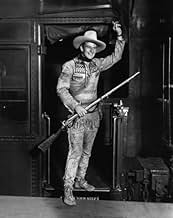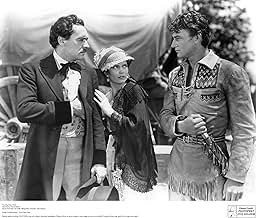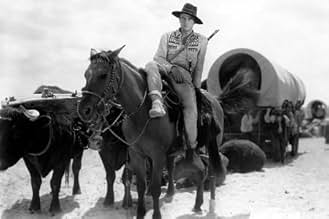Aggiungi una trama nella tua linguaBreck Coleman leads hundreds of settlers in covered wagons from the Mississippi River to their destiny out West.Breck Coleman leads hundreds of settlers in covered wagons from the Mississippi River to their destiny out West.Breck Coleman leads hundreds of settlers in covered wagons from the Mississippi River to their destiny out West.
- Regia
- Sceneggiatura
- Star
- Premi
- 5 vittorie totali
- Red Flack
- (as Tyrone Power)
- Wagon Train Man
- (non citato nei titoli originali)
- Pioneer
- (non citato nei titoli originali)
- Indian
- (non citato nei titoli originali)
- Sid Bascom
- (non citato nei titoli originali)
- Pioneer
- (non citato nei titoli originali)
- Wrangler
- (non citato nei titoli originali)
- Pioneer Child
- (non citato nei titoli originali)
Recensioni in evidenza
As sweeping & magnificent as its story, Raoul Walsh's THE BIG TRAIL is a wonderful film, as entertaining as it was more than seven decades ago. With very good acting and excellent production values, it lives up to its reputation as the talkies' first epic Western.
John Wayne, pulled from obscurity for his first important movie role, looks impossibly young, but he immediately impresses with the natural charm & masculine authority he brings to the hero's role; he quietly dominates the film with the attributes which would someday make him a huge star. Marguerite Churchill is fetching as a lovely Southern belle who slowly warms to the Duke's attentions. Dialect comic El Brendel is great fun as a Swedish immigrant beset with mule & mother-in-law woes; his appearance in a scene signals laughs for the viewer.
Looking & sounding like a human grizzly bear, Tyrone Power Sr., vast & repulsive, makes a wonderful villain. Slick cardsharp Ian Keith is a sophisticated bad guy. (His famous physical similarity to John Gilbert is very apparent here.) Silent movie character actor Tully Marshall is impressive as a wily old mountain man who helps guide the wagon train. Corpulent Russ Powell, as a friendly fur trapper, puts his vocal talent for making nonsense noises to good use. Sharp-eyed movie mavens will spot Ward Bond as one of the Missouri settlers.
What will surprise many modern viewers is that THE BIG TRAIL was filmed in an early wide screen process, called Grandeur. More than living up to its name, the picture looks marvelous, with Walsh showing a mastery of the new technology. He fills the screen, every portion of it, with action. Notice during the crowd scenes, how everyone is busy doing real work, which adds so much to the verisimilitude of these sequences. Walsh deserves great credit for being one of the first directors to use wide screen. In addition, the film is blessedly free of the rear projection photography which blights so many older films. It should also be stressed that it is only natural that the soundtrack sounds a little primitive; talkies were still in their cradle. That Walsh was able to use a microphone at all, with most of the scenes shot out of doors, is more kudos for him.
THE BIG TRAIL was not a box office success. In 1930, William Haines' comedies were the big money makers and the public was looking for fare other than intelligent Westerns. Most of the cast slipped into obscurity, including Wayne. It would not be until 1939, when John Ford rescued him in STAGECOACH, that John Wayne's legend would begin in earnest. And despite its grand & sweeping vistas, it would be another 25 years before wide screen caught on with Hollywood, largely as an answer to the economic threat from television.
The Big Trail itself is a wonderfully modern-seeming western compared to other entries of the early sound era. It has an air of authenticity about it, as there is almost a documentary feel of the film in its depiction of harsh life on the Oregon Trail. Finally, there is the reason most people view this film - the birth of John Wayne's cowboy persona, not a cartoon character with either a black or white hat as many actors in the early westerns were, but a character of flesh and blood whose motivations you could understand and empathize with. Also note the presence of Ward Bond in a supporting role who, along with John Wayne, was a staple of the later John Ford westerns.
Despite its technical beauty and the presence of John Wayne, this film flopped at the box office. John Wayne went back into obscurity and did not emerge again until nine years later in "Stagecoach", where he played a part very similar to the one he plays here.
But we're here to talk about The Big Trail. John Ford's fellow director Raoul Walsh spotted this tall kid on the set of one of Ford's films and thought he had potential. He wanted to make him the lead in a big budget western that Fox was planning to do. The film as planned would be an homage to the famous classic silent western The Covered Wagon.
In watching The Big Trail I was struck by how similar Wayne's character of Breck Coleman here is to the Ringo Kid in Stagecoach. Both characters were likable young cowpokes, but both were also on a mission of vengeance. And of course both films were done on location and show the expense in making them. No studio product here with a backlot western set.
I also don't think that it was an accident that Wayne got this break at the beginning of the sound era. Raoul Walsh, I'm guessing looked around Hollywood and probably didn't think a whole lot of movie cowboys would have staying power in sound. That's something else Walsh spotted in Wayne.
According to what I've read The Big Trail flopped because after spending all that money to make the film in an early wide screen process, some genius at Fox realized that their theaters weren't equipped with the wide screen to show it. And when the Great Depression hit there would be no money to widen those screens at Fox movie houses. So The Big Trail got a limited release, even in what we would call a formatted version, and lost money big for Fox films.
Marguerite Churchill is fine as the crinoline heroine who Duke wins, loses and wins again from Ian Keith. Keith, Charles Stevens and F. Tyrone Power are the trio of villains Wayne has to deal with.
F. Tyrone Power is the father of the famous movie legend Tyrone Power. He was a big burly man with a grand background in classic roles on screen and on stage. I wouldn't be surprised if his son who would have been 15 at the time might not have been hanging around the set.
Also look for Ward Bond though you might have trouble spotting him under a big bushy beard.
Watching The Big Trail now it is interesting to speculate where John Wayne's career might have gone if The Big Trail had been a big hit.
Early movies could use or consult people WHO HAD BEEN THERE. Of course, USC quarterback John Wayne, or even Irish thespian Tyrone Power, Sr. (who tried farming and hated it) are exceptions, but there is a ring of authenticity with "The Big Trail" which you can't get second hand. And if those aren't real plains Indians by the hundreds, I'll eat my breech clout!
And the scenery! Unfortunately, cinematographers hadn't mastered filters, so the sky is always washed out, and dust and haze obscure the deep focus. But even these limitations paradoxically serve to provide a feel of endless horizons. And the locations are spectacular, especially the Indian village, which is so enormous that at first I thought half of it was backdrop. Then, there is the spectacular rope drop of animals and equipment down an escarpment that could have inspired Herzog's "Fizcarraldo".
Of course, the acting is hammy and dialog corny, but remember, The Big Trail is from 1930 and that early sound movies had yet to evolve fully from silent film technique, which called for pantomime, with its exaggerated facial expression and movement. Also bear in mind that the style of reading lines came directly from the theater stage from which lines, lacking voice amplification, were delivered as oratory to be heard in the back rows.
Robert Flaherty in his landmark documentary "Nanuk of the North" actually set up his scenes dramatically. He was by no means a fly on the wall. If Flaherty could have made a documentary about the epic journey of a pioneer wagon train through the great Western prairies, I doubt if he could have achieved much greater impact than "The Big Trail".
Lo sapevi?
- QuizIncredibly, six different versions of this film were shot simultaneously: (1) a 70mm version in the Grandeur process for exhibition in the biggest movie palaces, (2) a standard 35mm version for general release, (3) a 35mm alternate French-language version La piste des géants (1931)', (4) a 35mm alternate Spanish-language version La gran jornada (1931), (5) a 35mm alternate German-language version Die große Fahrt (1931), and (6) a 35mm alternate Italian-language version Il grande sentiero (1931). The four alternate-language versions were shot with (mostly) different casts.
- BlooperBased on the 26 star flag (1837-1845), the film takes place in the 1840s. Many of the settlers use Springfield Model 1873 "trapdoor" rifles. This was common in Hollywood because the 1873 was based on the 1861 rifled musket, which closed a continuous line of muskets going back to 1795, so it easily could stand in for a muzzle loading musket to the untrained eye.
- Citazioni
Breck Coleman, Wagon Train Scout: We can't turn back! We're blazing a trail that started in England. Not even the storms of the sea could turn back the first settlers. And they carrie dit on further. They blazed it on through the wilderness of Kentucky. Famine, hunger, not even massacres could stop them. And now we picked up the trail again. And nothing can stop us! Not even the snows of winter, nor the peaks of the highest mountain. We're building a nation and we got to suffer! No great trail was ever built without hardship. And you got to fight! That's right. And when you stop fighting, that's death. What are you going to do, lay down and die? Not in a thousand years! You're going on with me!
- Curiosità sui creditiOpening credits prologue: DEDICATED- To the men and women who planted civilization in the wilderness and courage in the blood of their children.
Gathered from the north, the south, and the east, they assemble on the bank of the Mississippi for the conquest of the west.
- Versioni alternativeFilmed in two versions simultaneously: widescreen process Grandeur in 70mm, and in standard 35mm. Some scenes were shot simultaneously in both formats; other scenes were shot twice, once for each format. The two versions are not identical in content - the 70mm version runs 125 minutes, while the 35mm version runs a shorter 108 minutes (but does contain some scenes not found in the longer widescreen version).
- ConnessioniAlternate-language version of La gran jornada (1931)
I più visti
- How long is The Big Trail?Powered by Alexa
Dettagli
Botteghino
- Budget
- 2.000.000 USD (previsto)
- Tempo di esecuzione2 ore 5 minuti
- Colore
Contribuisci a questa pagina




































